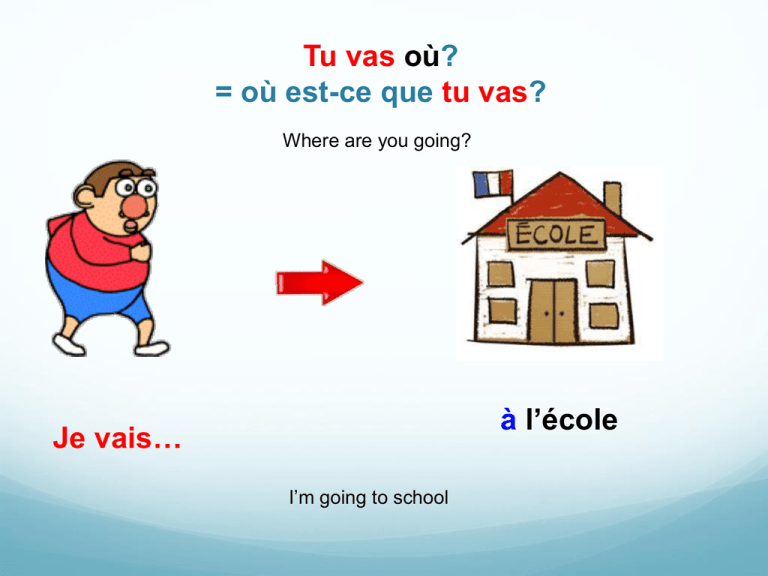
Tu vas au feq et tu passes devant la Savonnerie de quebec ? Découvre l’odeur vedette de note
- Deuxième personne du singulier du présent de l'indicatif : « Tu vas ». Exemples : - Ne l'écoute point, mon garçon, reprenait la mère Lefrançois ; ils t'ont déjà bien assez martyrisé ? tu vas t'affaiblir encore. Tiens, avale ! Flaubert, Madame Bovary

" Tu vas où? " "Je me rends à l'évidence." Poster nath Keep CalmoMatic
Tu vas au travail. You go to work / You're going to work Vous allez chez le docteur. You go to the doctor. / You are going to the doctor. Note that the verb form changes depending on who is acting. Remember that in French, to say you, you will use either: - tu to address one person you know well, i.e. " informal " and " singular "

Tu vas où ? Blagues et les meilleures images drôles!
You may also say: Comment tu vas? on it direct construction and the tu form. A typical answer for "comment vas-tu?" could be: - Je vais bien - I'm fine (remember French use "aller", not "être" - we don't say "je suis bien" but "je vais bien". Comment vas tu? - Level 1 - French Conversation. Watch on.

Tu vas où RLRA YouTube
Vas avec un « s » est utilisé dans deux cas, soit c'est le verbe conjugué au présent à la troisième personne du singulier, soit c'est une exception à l'impératif quand il s'agit de la contraction de « va » et le pronom « y ». Pour des raisons euphoniques, les gens confondent souvent l'écriture de « va » sans « s » et « va » avec « s ».

tu vas ou Maison de la Poésie de Nantes
1 Answer Sorted by: 3 The "-" is mandatory when the subject is a pronoun and the subject and the verb are inverted because of the interrogative form: Que fait-il ? Que manges-tu ? Qui êtes-vous ? "Vas" does not mean "going" alone, there is not necessarily a one-to-one match between each word of a sentence in English and its translation in French.

Tu vas où ? by Eric Damain, 12inch with dom88 Ref116255039
Tu vas où translation in French - English Reverso dictionary, see also 'vase, vais, va, vaste', examples, definition, conjugation

Où vas tu? D’où viens tu? Level 1 French Conversation YouTube
Só é correcto perguntar tu vais?.Esta é a forma da 2ª pessoa do singular do presente do indicativo. A expressão tu vás identifica-se com a 2ª pessoa do singular do presente do conjuntivo. Deste modo, ela só poderá ser empregada em situações como «será necessário que tu vás?» ou «é urgente que tu vás?», mas não isoladamente.. Para mais informação sobre o emprego do.

D'où vienstu Gitan ? Où vastu ? eBook
Member. French. Apr 24, 2010. #5. "Comment vas-tu" can be used in any situation. "Comment ça va" is more used when speaking and "comment vas-tu" when writing. With your girlfriend you can use both in conversation and in writing I recommend you to use "comment vas-tu" if you want to be romantic. That's my point of view !

Tu vas où ? by Eric Damain, 12inch with dom88 Ref116255039
Tu vas où ? Je vais chez Gabe. Well, where you going? I'm going to Gabe's. Tu vas où ? - Au poste. Where you going? - To the station. Tu vas où ? - Je rentre. Where you going? - Home. Tu vas où avec cette tête? Where are you going with that head? Tu vas où ? - Dehors. Where are you going? -out.

TU VA ME MANQUER TU ME MANQUES DÉJÀ Tshirt Premium Homme rouge en 2020 Miss you, Tu vas me
Indicatif Présent je vais tu vas il va nous allons vous allez ils vont Passé composé je suis allé tu es allé il est allé nous sommes allés vous êtes allés ils sont allés Imparfait j' allais tu allais il allait nous allions vous alliez ils allaient Plus-que-parfait j'étais allé tu étais allé il était allé nous étions allés vous étiez allés

Tu vas où?
Traduction anglaise : to go aller au féminin | s'en aller | aller ? | ne pas aller | Imprimer | Exporter vers Word Indicatif Présent je vais tu vas il va nous allons vous allez ils vont Passé.

Tu vas ou ? YouTube
Verb to conjugate: Accents: â ä à é è ê ë î ï ô ö û ç French verb conjugation for aller Third group verb Conjugated with être English translation: to go aller for a woman | s'en aller |.

Où tu vas comme ça
where you headed Show more Jenny, où vas-tu ? c'est fermé par là ?. Jenny, where are you going? it's closed over there!. Kuzey, fils, où vas-tu? - je vais prendre une marche. Kuzey, son, where are you going? - I'll take a walk. D'accord, alors où vas-tu ? Okay, so where you going? Alors, où vas-tu après ça ? So, where you going after this?

"Je viens d'où tu vas " Spectacle Jeune Public à La Vista Victoire 2
Tu vas, c'est le verbe aller conjugué au présent, avec le sujet tu. On récapitule la conjugaison de ce verbe : je vais, tu vas (avec un s ), il va, elle va, on va, ça va (sans s ). Comme on le voit, c'est donc à la troisième personne que ce verbe ne reçoit pas de s.

Où tu vas quand tu dors en marchant? 2022 au Parc des Moulins Photos Lise Breton Flickr
tu t'en vas => va-t'en ( verbe s'en mêler : tu t'en mêles => mêle-t'en) Il faut un trait d'union pour les autres personnes de l'impératif : allons-nous-en allez-vous-en Va ! est une interjection qui se place souvent en fin de phrase. Elle est utilisée, entre autres, pour encourager.

"Quand tu ne sais plus où tu vas, regardes d'où tu viens" "When you don't know where you're
Tu. The informal, singular subject pronoun tu ( listen) indicates an intimate, amicable, and/or equal relationship between two people, and as such it is used with family, friends, lovers, colleagues, and classmates. Kids always use it with one another, as do most teens, even when meeting for the first time. Likewise, adult friends of friends.